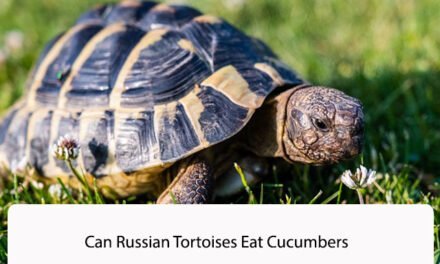Tortoises are known for their herbivorous diet, but as pet owners, it’s important to know what foods are safe for them to eat. One common question that arises is whether tortoises can eat mint. Mint is a popular herb used in many culinary dishes and teas and is known for its refreshing taste and aroma. But is it safe for tortoises to consume?

As we researched this topic, we found that mint is safe for tortoises to eat in small amounts. In fact, it can even have some health benefits for them. Mint is known for its antioxidant and anti-inflammatory properties, which can help boost a tortoise’s immune system and reduce inflammation in their body. However, it’s important to note that mint should only be given as an occasional treat and not as a staple food in their diet.
When feeding mint to your tortoise, it’s important to make sure that it’s fresh and free of any pesticides or harmful chemicals. You can also chop it up into small pieces to make it easier for them to consume. While mint is safe for tortoises, it’s important to remember that their diet should primarily consist of leafy greens and vegetables. As with any new food, it’s important to introduce it slowly and monitor your tortoise for any adverse reactions.
Understanding Tortoise Diet
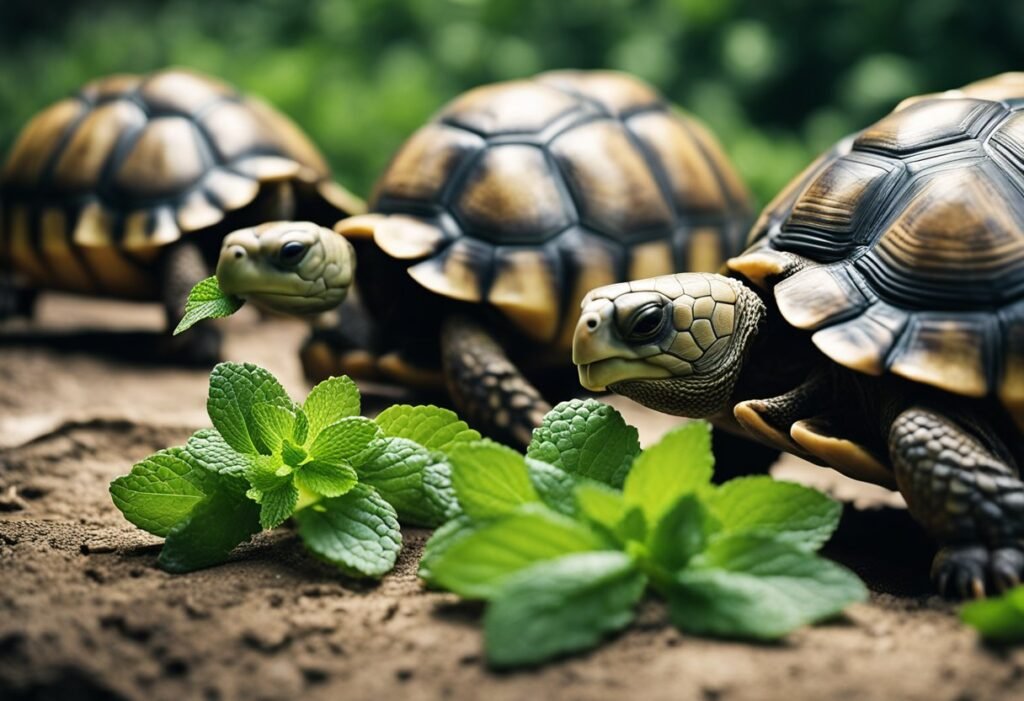
When it comes to feeding our tortoises, it’s important to understand their natural diet in the wild. Tortoises are herbivores, which means they primarily eat plants. Their diet consists of a variety of grasses, weeds, flowers, and leaves.
It’s also important to note that different species of tortoises have different dietary needs. For example, some tortoises may require a higher protein diet than others. It’s important to research the specific dietary needs of your tortoise species before feeding them anything new.
When it comes to feeding our tortoises, we should aim to replicate their natural diet as closely as possible. This means providing them with a variety of fresh, leafy greens and vegetables. It’s also important to ensure that they have access to clean water at all times.
While some tortoise owners may be tempted to offer their pets treats like fruits or herbs, it’s important to exercise caution when introducing new foods. Some foods, like mint, may be safe for tortoises in small quantities, but can be harmful in larger amounts.
In general, it’s best to stick to a diet of fresh greens and vegetables, and avoid feeding your tortoise anything that hasn’t been thoroughly researched and deemed safe. By understanding our tortoise’s natural diet and providing them with the right foods, we can help ensure their health and happiness for years to come.
What is Mint?

Mint is a herb that is commonly used in cooking and as a flavoring agent in many foods and beverages. It is a member of the Lamiaceae family, which also includes other popular herbs like basil, rosemary, and oregano. Mint is known for its fresh, cool taste and its ability to soothe upset stomachs.
There are many different varieties of mint, including peppermint, spearmint, and chocolate mint. Peppermint is the most commonly used variety in cooking and is often used to flavor candies, gum, and toothpaste. Spearmint is another popular variety and is often used in savory dishes like lamb and vegetables.
Mint is also known for its medicinal properties. It has been used for centuries to treat a variety of ailments, including digestive issues, headaches, and respiratory problems. Mint contains a compound called menthol, which is responsible for its cooling and soothing effects.
Overall, mint is a versatile herb that is used in many different ways. While it is safe for humans to consume, it is important to consider whether it is safe for other animals, like tortoises, to eat.
Can Tortoises Eat Mint?
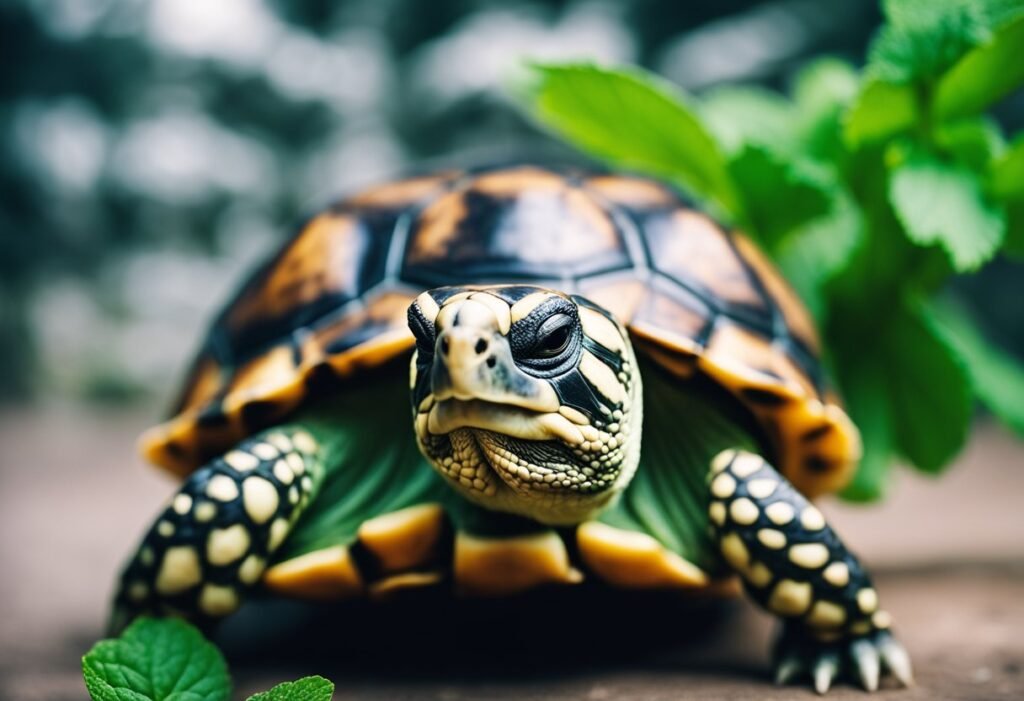
Mint is a popular herb used in many culinary dishes and beverages. However, when it comes to feeding mint to tortoises, there are a few things to consider.
Firstly, it’s important to note that tortoises have a very specific diet that varies depending on their species. Some tortoises are strictly herbivores, while others may consume small amounts of insects or other animal matter.
In general, it’s safe for tortoises to eat small amounts of mint. Mint is not toxic to tortoises, and it may even have some health benefits. Mint is known to have anti-inflammatory properties and can help soothe digestive issues.
However, it’s important to remember that mint should only be given to tortoises in moderation. Too much mint can cause digestive upset and diarrhea. It’s also important to avoid feeding mint that has been treated with pesticides or other chemicals.
In conclusion, while it’s safe for tortoises to eat small amounts of mint, it should be given in moderation and with caution. Always consult with a veterinarian or reptile specialist before adding any new foods to your tortoise’s diet.
Effects of Mint on Tortoises
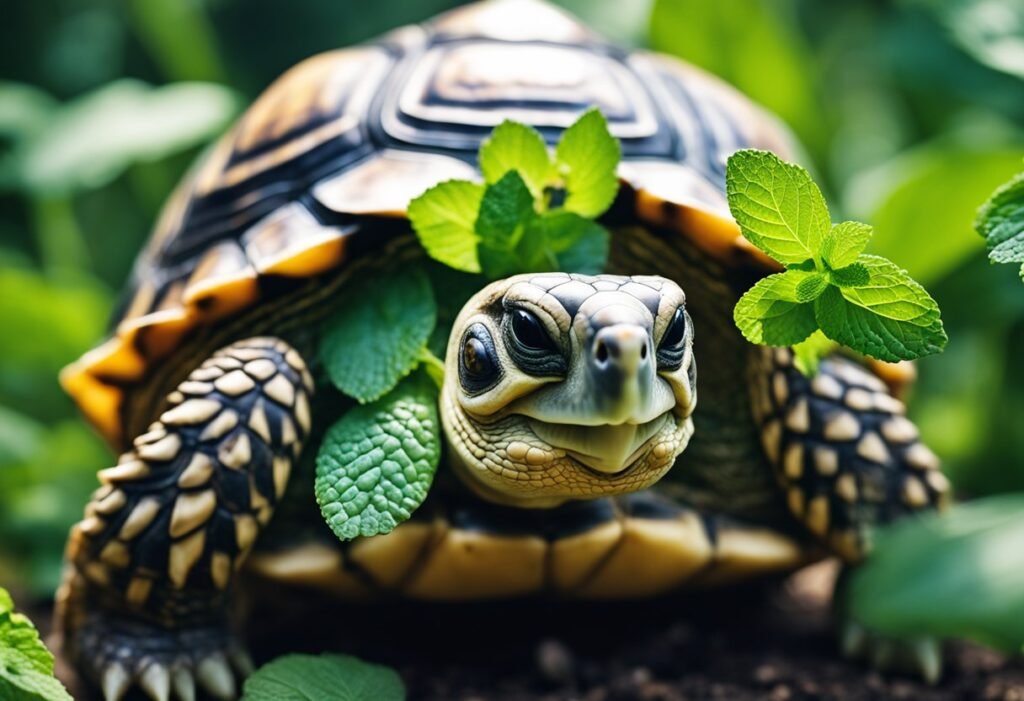
Positive Effects
Mint leaves are a good source of vitamins and minerals for tortoises. They contain vitamin A, vitamin C, calcium, and iron. In addition, mint has anti-inflammatory properties that can help with digestive issues and respiratory problems in tortoises.
However, it is important to note that mint should only be given to tortoises in small quantities as part of a balanced diet. Too much mint can cause diarrhea and upset stomach in tortoises.
Negative Effects
While mint can be beneficial for tortoises in small amounts, it is important to be aware of the potential negative effects. Mint contains a compound called menthol, which can be toxic to tortoises in large quantities.
In addition, mint can interfere with the absorption of calcium in tortoises, which can lead to metabolic bone disease. Therefore, it is important to limit the amount of mint given to tortoises and ensure that they are receiving a varied and balanced diet.
Overall, while mint can be a healthy addition to a tortoise’s diet in moderation, it is important to be aware of the potential negative effects and to consult with a veterinarian before introducing mint or any new food to your tortoise’s diet.
Alternatives to Mint for Tortoises
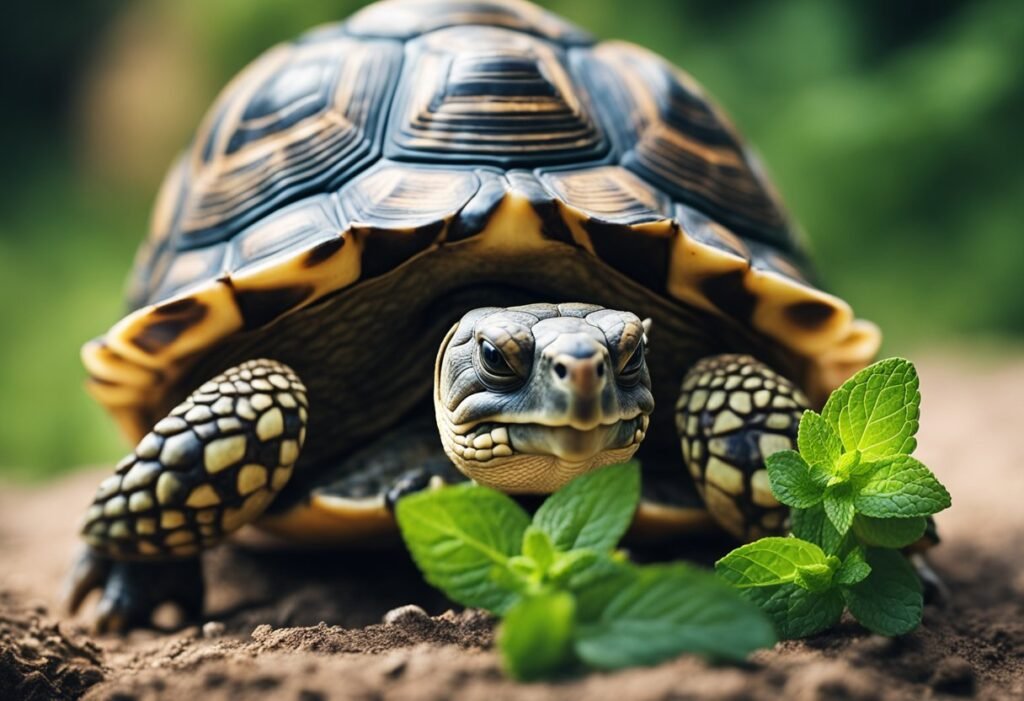
If you’re looking for alternatives to mint for your tortoise, there are plenty of options to consider. Here are a few options that you can try:
- Dandelion greens: These greens are rich in vitamins and minerals that are essential for your tortoise’s health. They also have a slightly bitter taste that most tortoises enjoy.
- Hibiscus flowers: These flowers are not only beautiful, but they’re also a great source of vitamin C and antioxidants. They have a slightly tart taste that most tortoises enjoy.
- Rose petals: These petals are not only beautiful, but they’re also a great source of vitamin C and antioxidants. They have a slightly sweet taste that most tortoises enjoy.
- Parsley: This herb is a great source of vitamins and minerals that are essential for your tortoise’s health. It has a slightly bitter taste that most tortoises enjoy.
- Coriander: This herb is a great source of vitamins and minerals that are essential for your tortoise’s health. It has a slightly spicy taste that most tortoises enjoy.
Remember to always introduce new foods to your tortoise slowly and in small quantities to avoid any digestive issues.
Conclusion
In conclusion, while mint is not toxic to tortoises, it is not an ideal food for them. Tortoises are herbivores and require a diet that is high in fiber and low in protein and fat. Mint, on the other hand, is high in essential oils that can upset a tortoise’s digestive system and cause health problems.
While a small amount of mint as a treat is unlikely to cause harm, it is best to stick to a varied diet of safe, nutritious foods such as leafy greens, vegetables, and fruits. If you are unsure about whether a particular food is suitable for your tortoise, it is always best to consult with a veterinarian or a reptile specialist.
Remember, the health and well-being of your tortoise should always be your top priority. By providing them with a balanced diet and a suitable living environment, you can help ensure that they live a long and healthy life.
Frequently Asked Questions
Are there any herbs that are safe for tortoises to eat?
Yes, there are several herbs that are safe for tortoises to eat. Some examples include rosemary, thyme, oregano, and sage. These herbs can provide a variety of health benefits for your tortoise, such as boosting their immune system and aiding in digestion.
What are some safe fruits for tortoises?
Tortoises can safely consume a variety of fruits, including apples, bananas, and strawberries. These fruits can provide your tortoise with essential vitamins and minerals, as well as hydration.
Can tortoises safely consume basil?
Yes, basil is safe for tortoises to eat in moderation. It can provide a variety of health benefits, such as reducing inflammation and aiding in digestion. However, it should not be the only food source for your tortoise.
Is coriander safe for tortoises to eat?
Yes, coriander is safe for tortoises to eat. It can provide a variety of health benefits, such as aiding in digestion and reducing inflammation.
What about parsley – can tortoises eat it?
Yes, parsley is safe for tortoises to eat in moderation. It can provide a variety of health benefits, such as aiding in digestion and providing essential vitamins and minerals.
Are there any herbs that tortoises should avoid?
Yes, there are some herbs that tortoises should avoid. Examples include mint, tarragon, and chives. These herbs can be harmful to your tortoise and should not be included in their diet.





